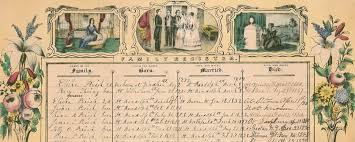Unraveling the Past: Exploring the Significance of Genealogical Records
The Importance of Genealogical Records
Genealogical records play a crucial role in tracing one’s family history and understanding the connections that bind us to our ancestors. These records serve as valuable resources for unraveling the past, preserving heritage, and connecting present generations to their roots.
Genealogical records come in various forms, including birth certificates, marriage licenses, census data, wills, deeds, military records, and more. Each document provides a piece of the puzzle that helps genealogists piece together their family tree and uncover hidden stories from the past.
One of the primary benefits of genealogical records is their ability to establish lineage and familial relationships. By tracing back through generations, individuals can learn about their ancestors’ occupations, residences, migrations, and life events. This information not only enriches personal knowledge but also fosters a sense of identity and belonging.
Moreover, genealogical records are essential for preserving historical narratives and ensuring that the legacy of past generations is not forgotten. By documenting family histories and passing down these records to future generations, we create a bridge between the past and the present, fostering a deeper appreciation for our heritage.
In addition to personal significance, genealogical records also have broader societal implications. They contribute to academic research, historical studies, genetic studies, and cultural preservation efforts. By compiling and sharing genealogical information, we contribute to a collective understanding of our shared history and promote cultural diversity.
In conclusion, genealogical records are invaluable tools for exploring our roots, preserving our heritage, and connecting us to the past. Whether delving into family history out of personal curiosity or academic interest, these records offer a window into the lives of those who came before us and help us appreciate the intricate tapestry of human experience across time.
Top FAQs About Accessing and Understanding Genealogical Records for Free
- What is the best free genealogy site?
- How to check your Ancestry for free?
- What is a genealogical record?
- How to find genealogical records?
What is the best free genealogy site?
When it comes to finding the best free genealogy site, there are several options that cater to different needs and preferences. One popular choice among genealogists is FamilySearch.org, a comprehensive platform offering a vast collection of historical records, family trees, and research tools at no cost. FamilySearch’s collaborative approach and extensive database make it a valuable resource for those seeking to explore their family history without breaking the bank. Additionally, websites like Ancestry.com and MyHeritage offer limited free access to their databases and tools, making them worth considering for individuals looking to kickstart their genealogical journey without a subscription fee. Ultimately, the best free genealogy site may vary depending on the specific research goals and resources available to each researcher.
How to check your Ancestry for free?
Searching for your ancestry for free can be an exciting and rewarding journey. To begin exploring your family history without incurring costs, there are several accessible resources available online. Start by utilizing free genealogy websites and databases that offer basic tools for building your family tree, such as FamilySearch, MyHeritage, and Ancestry.com’s free trial period. Additionally, explore public records like census data, vital records, and historical archives that may provide valuable clues about your ancestors. Don’t forget to reach out to relatives for oral histories and family stories that could offer insights into your lineage. By leveraging these free resources and engaging in thorough research, you can take the first steps towards uncovering the mysteries of your ancestry without breaking the bank.
What is a genealogical record?
A genealogical record is a documented account of an individual’s or family’s lineage, typically containing vital information such as birth dates, marriage details, death records, and other significant life events. These records serve as essential tools for tracing one’s ancestry, connecting generations, and understanding familial relationships. Genealogical records come in various forms, including official documents like birth certificates, census data, wills, and immigration records, as well as personal artifacts such as family bibles, photographs, letters, and oral histories. By piecing together these records and artifacts, individuals can create a comprehensive narrative of their family history and gain insight into the lives and experiences of their ancestors.
How to find genealogical records?
Searching for genealogical records is a common query among individuals eager to uncover their family history. To find genealogical records, start by gathering information from family members, such as names, dates, and locations of ancestors. Next, explore online databases, archives, libraries, and genealogical societies that house a wealth of historical records. Utilize search engines and genealogy websites to access digitized documents like census records, vital records, military records, and more. Don’t hesitate to reach out to local repositories or historical societies for assistance in locating specific records relevant to your ancestry. By combining online resources with traditional research methods and seeking guidance from experts in the field, you can embark on a rewarding journey of discovering your family’s past through genealogical records.

